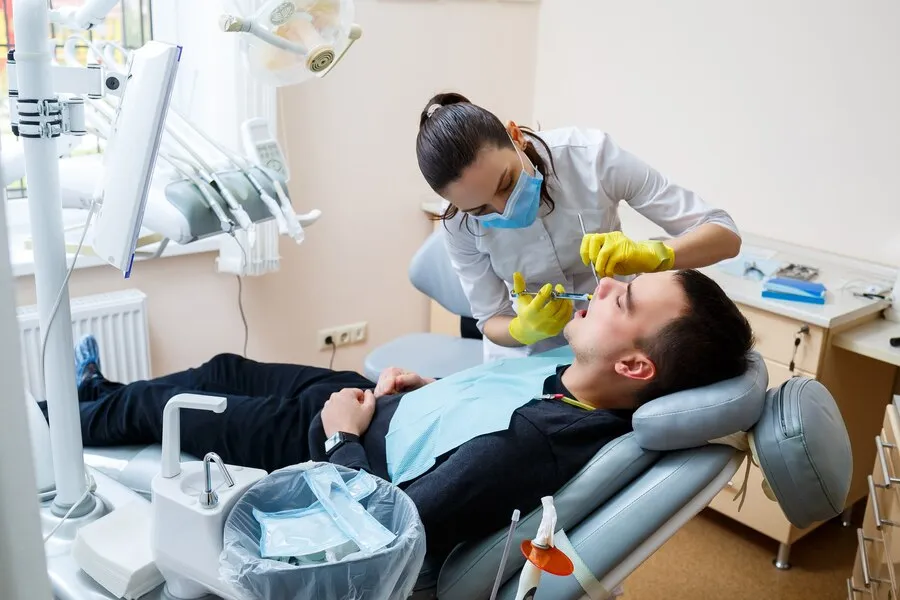Table of Contents
Understanding Dental Emergencies
Dental emergencies can take many forms, often appearing unexpectedly and causing significant pain and discomfort. Handling dental emergencies can be crucial in mitigating pain and reducing the likelihood of further complications. Differentiating between minor dental issues and emergencies is vital for effective treatment. Minor problems, like slight tooth pain from food lodged between teeth, can often be handled at home. However, intense toothache might signal serious issues, such as an abscess or infection, requiring immediate dental care. Recognizing the signs of dental emergencies and knowing when to seek prompt, professional attention can improve outcomes and potentially prevent more serious health issues.
Common Types of Dental Emergencies
Toothaches, broken or chipped teeth, knocked-out teeth, and lost fillings or crowns require prompt attention:
- Toothache: Persistent pain could indicate serious issues like cavities or bacterial infection. If not taken care of, it can result in severe complications and health issues.
- Broken or Chipped Teeth: These injuries can cause significant pain and affect appearance and function. Immediate dental care helps prevent further damage and relieves discomfort.
- Knocked-Out Tooth: Quick action is crucial. Proper handling and prompt dental care increase the chances of successfully replanting the tooth, avoiding more complex treatments.
- Lost Filling or Crown: These help shield your teeth against harm and deterioration. Urgent dental treatment is essential to prevent additional problems and complications.
Immediate Steps to Take During Dental Emergencies
In a dental emergency, your actions can impact the outcome. Follow these first-aid steps:
- Clean the area and relieve minor infections by rinsing your mouth with warm water.
- Place a cold compress on the impacted region externally to decrease swelling and alleviate pain.
- If food is trapped, gently use dental floss to remove it, taking care not to cause further injury.
- Avoid placing painkillers directly on the gums, as this can burn the tissue. Instead, use over-the-counter pain relief until you can see a dentist.
Also Read: What Are Hybrid Dentures and Who Can Benefit From Them?
When to Seek Professional Help
Not every dental issue requires an immediate professional consultation. However, specific symptoms should never be ignored. Severe pain, excessive swelling, or persistent bleeding are clear indicators of a dental emergency that requires professional care. Seeking timely help in these situations can prevent further complications and health problems.
Failure to address these symptoms may result in more severe problems, such as infections that may travel to different body areas. If a tooth infection is not treated, it could lead to an abscess or possibly broader health problems. Hence, knowing when to take action and promptly seek professional dental guidance.
Prevention Strategies
Preventing dental issues is, without a doubt, the most effective approach to maintaining good oral health. Routine dental examinations and thorough oral care routines, like brushing and flossing, can significantly decrease the likelihood of experiencing dental emergencies. Moreover, oral health can be improved by making lifestyle adjustments such as reducing sugar consumption and refraining from smoking.
For more detailed preventive tips and practices, the Centers for Disease Control and Prevention offers comprehensive guidance on maintaining oral health. Wearing mouthguards during sports or high-risk activities can also prevent dental injuries, protecting your teeth from unexpected impacts and accidents.
Creating a Dental Emergency Kit
Being prepared for dental emergencies can significantly improve the outcome. A well-stocked dental emergency kit should include essential items such as gauze, a small container with a lid (for storing a knocked-out tooth), and pain relievers like ibuprofen. Additionally, having a list of dental emergency contacts and hotline numbers can be exceptionally beneficial.
Also Read: Maintaining Optimal Oral Health with Dentures
Final Thought
Successfully handling dental emergencies necessitates understanding, readiness, and prompt intervention. By familiarizing yourself with the typical dental emergency scenarios, knowing what to do right away, and identifying when it’s time to seek professional assistance, you can effectively manage these issues. Consistent dental check-ups and preventative steps protect against unexpected dental problems and ensure long-term oral health.




